- Home
- Neal Stephenson
The Mongoliad: Book Two Page 35
The Mongoliad: Book Two Read online
Page 35
“Yes, my Khan,” Chaagan answered.
“Would you fall on your sword right now if I asked you to?”
A muscle twitched in the guard’s jaw, and he hesitated briefly before barking out his answer. “Yes, my Khan.”
“Would it be a good death?” Ögedei asked.
Chaagan looked away and did not answer.
Ögedei stepped closer to the guard and put his hand on the man’s shoulder. He felt Chaagan twitch under his hand, and a flicker of fear twisted the guard’s lips. “I think,” Ögedei said, his voice dropping to a conspiratorial whisper, “that if I were to run out of this tent and engage the enemy—an enemy that wants nothing more than for me to present myself in that fashion—that I would be doing something very similar to falling on my own sword.” His grip tightened on Chaagan’s shoulder. “Do you agree?”
Chaagan nodded. “Yes, my Khan.
“That would not be a very good death.”
“No, my Khan.”
“I should let men like you—and Alagh, as well—fight for me, because that is your duty. That is all that you want to do for me—to fight in my name, to fight for the glory of the Empire.”
Chaagan stood up slightly under Ögedei’s hand. “Yes, my Khan.”
“And yet, you are here with me now. Inside this damned tent, watching your Khagan fight with a...pillow. There is little glory in that, is there?” Ögedei chuckled at Chaagan’s bleak expression. He released his grip and patted the man’s shoulder—the way a father absently reassures a confused child. “Let us watch the fight outside this tent,” he said, nodding toward the straps that held the tent flap closed. “I want to witness my fierce warriors in combat. I want to behold the glory of their actions.”
The wine would always fill him with bravado, but without the brittle bluster it provided, all that was left was a squirming nakedness, a raw awareness of the prisoner he had become. He had been a warrior of the steppes once, but now he was the Khagan, and that title was nothing more than a golden chain crushing the life out of him. He could not participate in the glory of the Mongol Empire; he could only bear witness to it.
29
Deus Iudex Iustus
“WHAT ARE YOU doing up there?” the guard demanded, fumbling for his sword.
Ferenc hung halfway to the top of the old Roman wall, frozen with indecision, fingers of one hand clinging to the gap between two blocks of tufa, and the other scrabbling for purchase on a brick-and-mortar facing.
Left behind on the path below the wall, Ocyrhoe backed away from the guard, who was focusing his attention on the one most likely to escape—the youth clinging to the wall.
“Get down!” The guard raised his sword—with little effect, since Ferenc’s feet were at least two yards over his head.
Bits of grout and decaying brick sifted down from Ferenc’s fingers and broke away from his questing toes. Should he keep going? Was Ocyrhoe going to run?
Comically, the guard now began to jump, waving his blade in an attempt to close the distance. Ferenc arched his back and raised his feet. More grout broke free. Some of it sifted into the guard’s face, and he swore, backing off to rub his eyes.
Ferenc and Ocyrhoe hadn’t planned well, that was obvious—run ragged by their mission and the environment of fear that was sweeping Rome. If they were split up, where would they find one another again? Ferenc found it strange that he and this tiny girl had become so inseparable, as if they had been running together, struggling to survive, since they were children.
His mother’s secret language had helped, of course. She had never openly taught it to him, as he was not one of them, the szépasszony who wove the kin-knots, but he had learned it regardless, absorbing the signs and gestures and codes by being attentive in her presence, and by remembering how she had touched and tickled him when he was a baby. The tündér magic all children know when they are born and then forget as they learn to be human.
The guard, frustrated by Ferenc’s inaccessibility, now turned his attention to Ocyrhoe. He extended his blade and lumbered toward her.
With a small yelp, she leaped onto the wall and scrabbled up along the brickwork, grabbing frantically at higher handholds in an effort to climb out of the guard’s reach.
Looking up and to her left, she shouted at Ferenc, “Ascende!”
The guard grunted and stretched up, reaching for her dangling foot. She yelled, jerking and kicking her leg.
The guard got a grip on her ankle and yanked, pulling her off balance. Her legs swung free, and as Ferenc watched, her right hand slipped.
“Ascende!” she cried, oblivious to her precarious hold on the wall.
And leave her behind? Where was he supposed to go? What was the message they were supposed to deliver? The old man in the Septizodium—the one with the kind face and the presence—had sent them out of the city on a secret mission, but he had described that mission only in the language Ocyrhoe knew. If Ferenc kept climbing, he would be leaving Ocyrhoe behind, and that meant abandoning the mission.
Ocyrhoe swung her free hand up and managed to grab a loose brick. The brick slid sideways but held. The guard, just a few feet below her, let loose a stream of frustrated curses.
The boy gauged the distance between Ocyrhoe and her pursuer, who had given up trying to grab her from the ground and had started climbing the wall himself.
She flattened against the wall, sucking in a breath, then planted her feet and resumed her climb, as quickly as the crumbling wall allowed. She was a good climber, but she didn’t have Ferenc’s experience or the guard’s strength.
The guard’s searching hand was now just inches below her heel. She wasn’t going to make it.
Ferenc shuffled laterally to his right. Just a little farther. He glanced down, checking his position, and then took a deep breath. Ocyrhoe looked up and to the left, her face screwed up in panic and confusion as she tried to figure out what he was doing.
He met her gaze and nodded once. Without you, there is no mission.
Ferenc let go of the wall.
* * *
Cardinal Sinibaldo Fieschi kept his eyes squeezed tightly shut as he whispered the seventh Psalm. “...Iudica me, Domine, secundum iustitiam meam et secundum innocentiam meam, quae est in me...” The rope burned across his palm and his knuckles ached, but he could not let his grip loosen. Not yet. “...Consumatur nequitia peccatorum; et iustem confirma; scrutans corda et renes Deus iustus...”
The body trapped in the rope—already he was no longer thinking about it as a living person—had stopped thrashing and clawing. As Fieschi continued to pray, he felt the man’s hands loosen and the deadweight increase. God strengthens my armor, he thought, for I am virtuous and upright in my heart. He heard a rattling noise, like sand being scattered across a stone floor, and the muscles in his hands cramped from exertion.
His prayer was cut short by a sound that escaped from his chest—part sob, part exclamation—and his hands opened without his willing the action. It was as if one of God’s angels had touched his wrists, and the ethereal touch of the divine messenger had broken his grip. He fell back and sprawled on the floor, gasping for breath. A weight lay against his legs. A heavy, still weight.
When he finally noticed the stink of death—the expelled shit and piss from the dead man’s bowels, mixed with the faint tang of blood—he opened his eyes. He shuddered slightly at the sight of Somercotes’s face—the bulging eyes decorated with a lacework of blood; the tongue protruding from the agonized mouth, a copious smear of blood across his lips and beard from his broken nose; dark shadows around the cardinal’s neck, a rope burn under his jaw.
“Convertetur dolor eius in caput eius,” Fieschi whispered, making the sign of the cross, “et in verticem ipsius iniquitas eius descendet.” He brought it upon himself.
He pushed Somercotes’s body away and, legs trembling, got to his feet. His hands ached, and his right palm was raw from the rope, but he was standing, he was alive. Somercotes was not. The distinction was very clear in Fi
eschi’s mind, uncluttered by remorse or guilt.
This was not his victory, his personal triumph. By garroting this heretic, he had saved the Holy Roman Church.
The ring. He remembered what they had been arguing about before the Will of God—Deus iudex iustus—had flowed into him and guided his hand. The ring that supposedly belonged to that charlatan—a cardinal’s ring. It was a symbol that would allow him to participate in the election of the next Bishop of Rome—a potentially key vote. He had to find that ring.
He crouched over Somercotes’s body and, trying to ignore the stench, pulled and poked through the simple robes, feeling for the ring. There were few places to hide anything in the cardinal’s garment, but he checked the seams for unusual bulges or gathers that would suggest a hidden pocket; after a few minutes of fruitless searching, he turned his attention to the dead man’s shoes. Without Somercotes’s feet in them, they were just old leather scraps—worn thin in the heels, the stitching unraveling along the outer edges.
Would he have hidden the ring in his chamber? Fieschi crawled toward one corner to begin, on his knees, feeling the stones in the wall for fit, trying to shift or pry each one out to reveal a hiding place. No success. He then stood and ripped the heavy mattress cloth, flinging away handfuls of the straw stuffing. From the pegs on the wall, he ripped down Somercotes’s cloak and extra robe, pawing through the cloth for the hard shape of a ring. He even tore apart the cardinal’s damaged Bible, though part of his brain knew there was no way to hide a ring within the pages of the book.
Nothing.
Fieschi glared at the body. Even in death, the man confounded him. Could he have secured it somewhere in the tunnels? No, that would be even more risky than hiding it in the room; he would have to keep it where he could find it quickly, and such a place would have to be nearby, familiar. Somercotes’s chamber was the only place where he could be afforded some privacy, where he could be assured he would not be disturbed while he hid the ring or retrieved it.
Did he even have it? Fieschi had to admit the possibility that Somercotes had been lying to him. His breath caught in his throat as he recalled the conversation he had overheard between Somercotes and the messengers. They had brought the ring back to the mad priest. He had heard them talking about it; he could distinctly remember the tone of Somercotes’s voice as he had examined it. An Archbishop’s ring...
“You fool.” He savagely kicked Somercotes’s body. “You lied to me.” It wasn’t a cardinal’s ring at all; it was the ring of an Archbishop.
Fieschi’s mind raced, sorting back through the letters and documents that he had read to the Pope in His Holiness’s final days. He had been so caught up in the speculation of who this stranger was and the effect his presence was going to have on the election of the new Pope that he hadn’t given enough thought to why the man was here or who he was.
There had been reports from Hungary, following the battle at Mohi. Reports of who had been lost at that battle. An Archbishop...
Fieschi needed time to think. He needed to figure out what to do next. Time to pray, even, if that would help. He looked at the room—the dead body, the torn clothes, the scattered straw from the ripped mattress—and realized, as if seeing it all for the first time, that he couldn’t simply walk away from the room as if nothing had happened. Bits of straw clung to his robes. His right hand was red and raw. No one could connect his appearance with what had happened here. Had anyone seem him with Somercotes?
The mad priest.
He could deal with him later. Right now, he had to get out of Somercotes’s room. He had to get rid of the robe he was wearing—the same plain vestment he had worn when he snuck into the city. It smelled too much like sweat and piss and shit. Like violent death.
His gaze was drawn to the small metal lantern that provided the illumination for the room, the flickering flame like a single, blinking eye. More of a wink, in fact, as if it knew some deadly secret it would impart to him if he would only pick it up.
Stepping around Somercotes’s body, he scooped up the lantern and went to the door. Placing the lantern on the floor, he lifted and removed the door’s timber bar, then carefully opened the door a few inches to check the hallway. Satisfied it was empty, he bent over and delicately plucked the small stub of candle from the lantern’s metal shell. The candle’s flame danced eagerly.
Fieschi tossed the candle into the scattered straw. The candle bounced once, then lay on its side. The flame grew brighter as it spread into the straw.
With a grim smile, he left the room, pulling the door shut behind him. No one would know of his handiwork, not until it was too late.
Omnis arbor, quae non facit fructum bonum, excidetur, he thought as he walked, and thrown to the fire...
* * *
Ferenc twisted and angled his body as he fell. He saw, out of the corner of his eye, Ocyrhoe’s open mouth and wide eyes as he flashed by her, but there was no time to tell her his plan. There was no time to do anything but pull his arms and legs in before he collided with the guard. He felt the guard’s head against his arm and side, and then the two of them were falling, a mass of flailing arms and legs.
They hit the ground, Ferenc on top, and the impact drove the air out of his lungs. He rolled off, then stood, wincing as he tried to put weight on his left leg. He had twisted his ankle. It wasn’t a bad sprain—he could walk, albeit it with a bit of a limp, and if he was careful, it would stop hurting in a day or so.
The guard groaned, eyelids fluttering, and his arms and legs jerked in uncoordinated spasms. He was stunned but not senseless. In a few moments, he would regain his wits.
Ocyrhoe landed lightly nearby and started jabbering at Ferenc. Ferenc shook his head and tried to grip her arm, but she yanked it from his grasp, poked his chest with an angry finger, and then pointed to the wall. Ferenc shook his head again and touched his left leg, taking a limping step. “I can’t climb,” he said. “Not quickly.” He grabbed at her arm again, with both hands this time, and held her fast while he signed. “We have to go. Unless you want to kill this guard.”
She snapped her mouth shut and glared at him. Her eyes darted back and forth like the tiny swallows Ferenc had once watched hunt and swoop across the flower meadows in the spring, and then she nodded. “Sequere,” she said, disengaging her arm from his grip. She took his hand and pressed her fingers against the top of his wrist. “We’ll find another spot to climb,” she signed.
He began to walk as fast as his rapidly swelling ankle allowed. He reversed their hands—now holding her—and began to sign. “Hard to climb now. Harder to jump. Can climb this side, but how to get down?”
She shrugged and shook her head, clearly not understanding his question.
Just before they turned a corner, he glanced over his shoulder. The guard was still on his back, feebly waving his arms and kicking his legs. He looked like a bug. In a moment, they would be out of his sight.
“Wall keeps people out,” Ferenc signed. “Have you ever been outside?”
She blushed and looked away, and he could feel her arm tense as she thought about pulling away. He had embarrassed her and was surprised at his reaction to her pain. He squeezed her arm, trying to tell her he did not mean to cause distress with the question. But he knew the answer.
Ocyrhoe had never been outside of Rome. She didn’t know what the other side of the wall looked like, much less the world beyond—but judging by her reaction, she understood why he had asked.
It didn’t matter how easy it was to climb the inside of the walls of Rome; the inside might be left to decay, but the outward-facing rampart must be kept reasonably strong and smooth, or it would not be any sort of barrier against enemies.
He had injured himself falling not much more than three times the height of a man. Jumping from three stories? Neither of them would survive.
“Need different route,” Ferenc signed. He thought of the dark places they had recently visited, the tunnels under the old temples of the city. His fi
ngers curled and tapped her forearm. “Underground. Can you find a way?”
30
Waiting For the Storm
ANDREAS SAT ON his pallet with a grunt of pain. The stone walls were a mercy during the rain and the wind, but in the murderous heat of summer, they made little difference, especially when it was a gray heat—a steaming, sunless heat. There was no breeze without or within, and little for him to do other than sweat.
In all the stories singers told of heroics and of battle, they rarely, if ever, spoke of the waiting or the coming down afterward. Unless it served the story, they didn’t speak of the wounds either. He tried to straighten his aching back and felt muscles move beneath skin so tight from exertion that he wanted only to fall into a deep slumber and never move again.
The bruises he had received on the First Field overlaid their own dull throbbing upon previous layers of older pains. Battle rush and focus on opponents permitted a man to ignore these irritations, but after battle, they came rushing back with an angry vengeance.
At Petraathen, Taran had taught them numerous exercises designed to drive away fatigue, as well as stretches that kept abused muscles and ligaments from seizing up, and he would need to do more of those soon or else suffer the consequences.
Still, Andreas sat, feeling the sweat pour down his face, acutely aware of his own mortality.
The fight against the Flower Knight a week ago had taken more out of him than it should have, and now he was staring at his sword hand, listening with a grimace as the finger bones clicked uncomfortably as he opened and closed his fist. That’s new, he thought.
“You look like hell,” Rutger said from the doorway. Even against the gray of the outside, the quartermaster was a dark silhouette. “I warned you this was dangerous.”
“Someone has to reap what I sowed,” Andreas replied with a rueful attempt at a smile, quickly distorted by a grunt of pain. Unless he got up and did his exercises, come morning he would barely be able to move at all. “Better the consequences fall on my head,” he said.

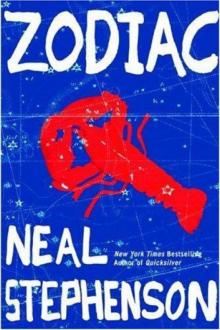 Zodiac: The Eco-Thriller
Zodiac: The Eco-Thriller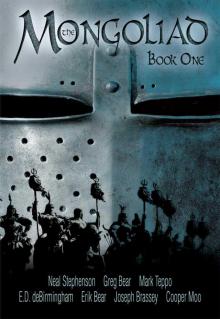 The Mongoliad: Book One
The Mongoliad: Book One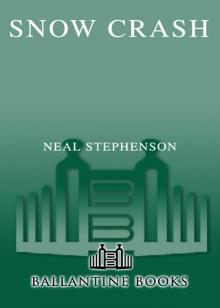 Snow Crash
Snow Crash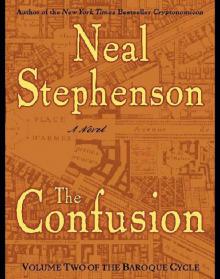 The Confusion: Volume Two of the Baroque Cycle
The Confusion: Volume Two of the Baroque Cycle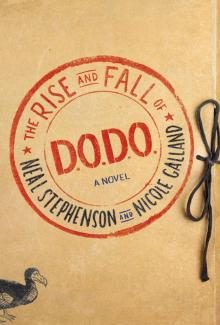 The Rise and Fall of D.O.D.O.
The Rise and Fall of D.O.D.O.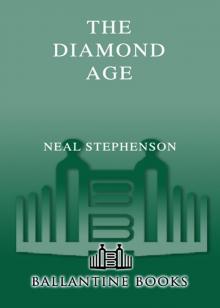 The Diamond Age: Or, a Young Lady's Illustrated Primer
The Diamond Age: Or, a Young Lady's Illustrated Primer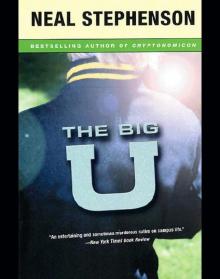 The Big U
The Big U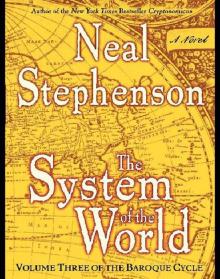 The System of the World: Volume Three of the Baroque Cycle
The System of the World: Volume Three of the Baroque Cycle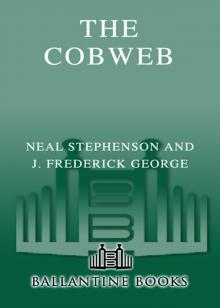 The Cobweb
The Cobweb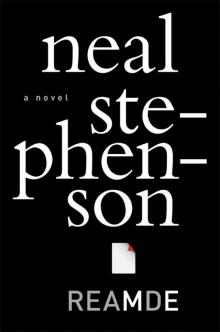 Reamde
Reamde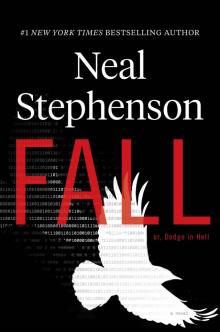 Fall; or, Dodge in Hell
Fall; or, Dodge in Hell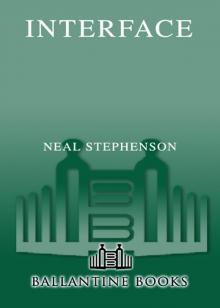 Interface
Interface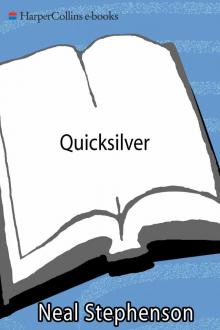 Quicksilver
Quicksilver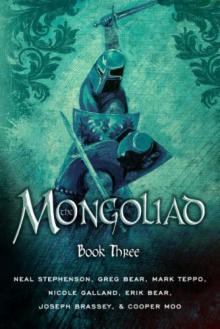 The Mongoliad: Book Three
The Mongoliad: Book Three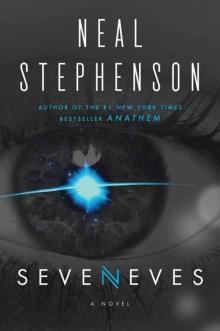 Seveneves
Seveneves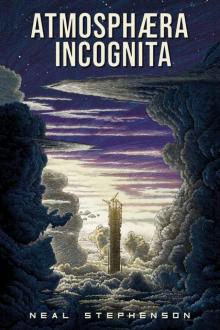 Atmosphæra Incognita
Atmosphæra Incognita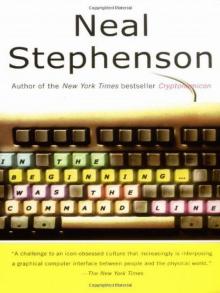 In the Beginning...Was the Command Line
In the Beginning...Was the Command Line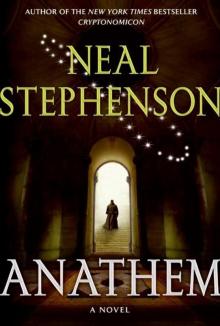 Anathem
Anathem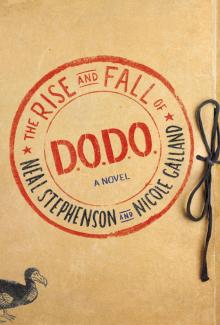 The Rise and Fall of D.O.D.O.: A Novel
The Rise and Fall of D.O.D.O.: A Novel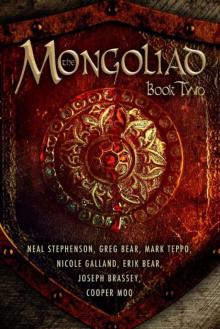 The Mongoliad: Book Two
The Mongoliad: Book Two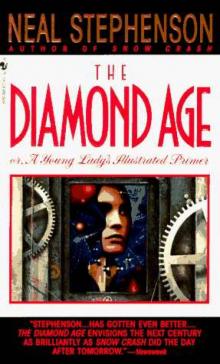 Diamond Age or a Young Lady's Illustrated Primer
Diamond Age or a Young Lady's Illustrated Primer THE System OF THE WORLD
THE System OF THE WORLD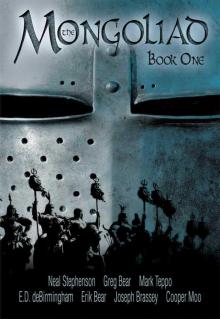 The Mongoliad: Book One tfs-1
The Mongoliad: Book One tfs-1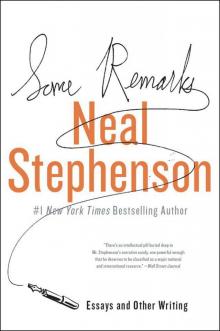 Some Remarks: Essays and Other Writing
Some Remarks: Essays and Other Writing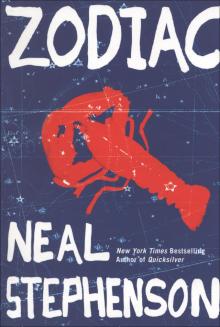 Zodiac
Zodiac Spew
Spew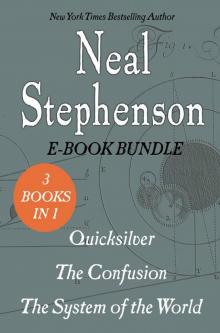 The Baroque Cycle: Quicksilver, the Confusion, and the System of the World
The Baroque Cycle: Quicksilver, the Confusion, and the System of the World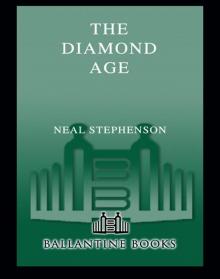 The Diamond Age
The Diamond Age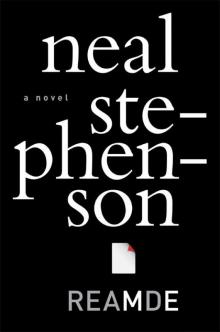 Reamde: A Novel
Reamde: A Novel In the Kingdom of Mao Bell
In the Kingdom of Mao Bell Mother Earth Mother Board
Mother Earth Mother Board Twelve Tomorrows - Visionary stories of the near future inspired by today's technologies
Twelve Tomorrows - Visionary stories of the near future inspired by today's technologies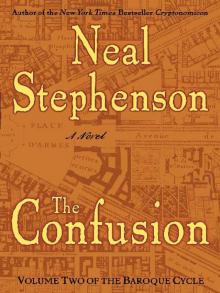 The Confusion
The Confusion The Great Simoleon Caper
The Great Simoleon Caper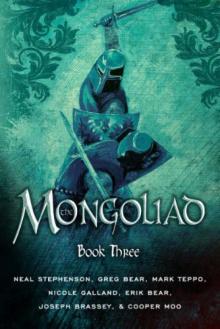 The Mongoliad: Book Three tfs-3
The Mongoliad: Book Three tfs-3